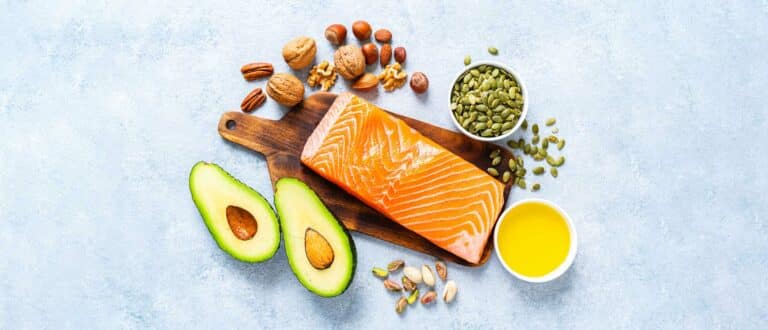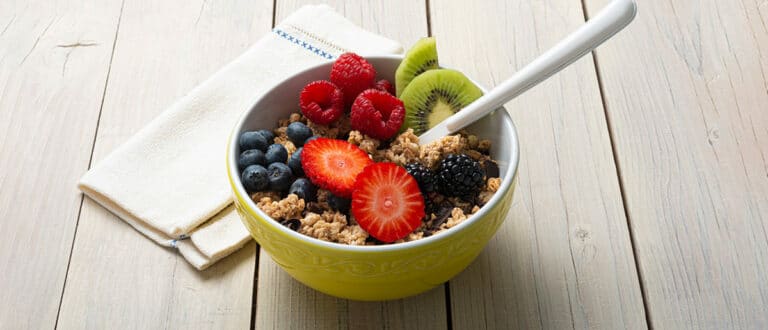The 10 Worst Foods for Your Joints (And the 3 Best Ones)
If you’re one of the 58.5 million people in the U.S. with arthritis, per the Centers for Disease Control and Prevention (CDC), you know the pain, stiffness, swelling, and limited range of motion.
Arthritis is an umbrella term for over 100 related ailments that affect your joints—like rheumatoid arthritis, osteoarthritis, and gout (1). Which means symptoms can vary from inconvenient to debilitating.
“People with arthritis are often prescribed an overwhelming amount of pain medications, but the first line of defense should be changing your diet,” says registered dietitian nutritionist Julia Diamond, RDN.
Regardless of your symptoms, a balanced anti-inflammatory diet can help relieve day-to-day arthritis pain (2). “Certain foods can trigger inflammation, while other foods can help regulate it,” says Dr. Jacob Hascalovici MD, PhD, a board-certified pain specialist, and Chief Medical Officer at Clearing.
“Anti-inflammatory foods help to stabilize blood sugar, reduce oxidative stress, and improve digestion—all of which reduce inflammation levels,” he adds.
Here, the inflammatory foods that might be contributing to your arthritic flare-ups, and what to eat instead, according to Diamond and Dr. Hascalovici.
Worst Foods for Arthritis
Before swearing off the pro-inflammatory foods listed below, Diamonds notes that everyone is different, so it’s worth testing to see how your body reacts to them. “If you do choose to change the way you eat, remember that you don’t have to change everything all at once,” says Dr. Hascalovici. “Try small changes.”
1. Refined carbs
White bread, muffins, cakes, and pastries all have one thing in common: they’re packed with refined flour and sugar. “Processed carbs may spike your blood sugar and set your body’s inflammatory response into action,” says Dr. Hascalovici.
Processed sugars—such as those in breakfast cereals and snacks—also do a number on your gut health (3), which can exacerbate inflammation (4).
What to eat instead
Diamond recommends avoiding these foods and instead opting for whole grains like oatmeal, brown rice, and quinoa. “Whole grains are more nutrient-dense, and provide numerous beneficial properties including fiber,” she adds.
2. Gluten
“If someone has one autoimmune disease, they have a higher risk of developing another, like celiac disease,” says Diamond. Celiac disease is an immune reaction to eating gluten, a protein found in wheat, barley, and rye.
If you struggle with frequent flare-ups, a gluten-free diet is an easy way to kill two birds with one stone. Studies have shown a gluten-free diet can reduce the inflammation that can contribute to both celiac and arthritis symptoms (5, 6, 7).
3. Added sugars
“A high sugar intake, including cane sugar and high fructose corn syrup, may contribute to unhealthy bacteria in your gut and may irritate your cells,” warns Dr. Hascalovici.
One study found that those who enjoyed high-fructose corn syrup-packed beverages—like soda, sweet tea, and juice—at least five times a week are more likely to battle arthritis than those who choose sugar-free drinks (8). What’s more, just one 12-ounce soda per day was found to increase the risk of rheumatoid arthritis by 63 percent (9). Yikes.
“Added sugars contribute to inflammation, and have a strong association with weight gain and obesity—which can increase your risk of any inflammatory disease,” says Diamond.
What to eat instead
Diamond suggests opting for sparkling water, unsweetened tea, or fruit- and vegetable-infused water.
4. Inflammatory fats
Dr. Hascalovici recommends staying away from vegetable oil, palm oil, and sunflower oil. “These oils don’t add much nutritional value to what you eat, and may irritate tissues in the body,” he adds.
Oils that have a higher ratio of omega-6 to omega-3 fatty acids—like sunflower, soybean, and safflower oil—are considered pro-inflammatory (10). Plus, trans fats—like vegetable oil and margarine—raise LDL cholesterol (the bad kind) and lower HDL cholesterol (the good kind) according to the American Heart Association (AHA) (11).
What to eat instead
Try cooking with omega-3-rich oils—like olive oil and avocado oil—which reduce inflammation (10).
5. Fried foods
“Frying modifies the chemical makeup of food. Your body digests fried food differently and triggers inflammation as it digests,” says Dr. Hascalovici. “People who consume fried food regularly have been found to be at higher risk for cardiovascular conditions and cancer.”
Western diets, rich in heavily processed and fried foods, may increase the risk of developing rheumatoid arthritis by contributing to inflammation and other risk factors like obesity, according to a review published in Autoimmunity Reviews (12).
6. Processed meats
Sorry, Ron Swanson. Bacon, sausage, and some deli meats are higher in Advanced Glycation End products (AGEs)—harmful compounds linked to stiffness and inflammation (13, 14). “AGEs form when protein and fats combine with sugars,” says Diamond. “When AGEs accumulate, cells are more susceptible to inflammation.”
What to eat instead
Sub in pure protein without all the processed junk—like lean steak, chicken, or fish. Diamond also recommends tried-and-true plant-based proteins such as tofu or lentils (but, skip the Beyond steak, it’s processed, too).
7. Salty foods
Popcorn, chips, frozen meals, and fast food are tasty, in part, because they’re packed with loads of salt. Avoiding salt may help to reduce inflammation (15).
Though Diamond notes more research is needed to confirm the role of salt on inflammation, it’s still important to watch your sodium levels. “For general health, aim to stay under 2,300 mg of sodium per day, however under 2,000 mg is even better in the protection against cardiovascular occurrences,” says Diamond.
What to eat instead
“Get creative with other spices and seasonings like herbs, cumin, cayenne, and garlic which only have one ingredient and no added salt,” says Diamond. “These are a great tool for bringing more flavor into your home-cooked meals while controlling the level of sodium.”
8. Alcohol
You knew this was coming (but, still boo). “The occasional glass of wine could be fine and may help reduce oxidative stress in your body,” says Dr. Hascalovici, “but regularly consuming alcoholic beverages in large quantities can spike blood sugar and damage your liver and kidneys.”
“Alcohol causes dehydration which directly promotes chronic inflammation (16),” says Diamond. To reduce arthritic flare-ups, it’s best to limit your intake.
9. Nightshades
“Tomatoes, eggplants, and white potatoes all belong to the nightshade family. Even though they are vegetables, they’re not recommended for inflammatory conditions,” advises Dr. Hascalovici. “That’s because they contain solanine, a bitter-tasting chemical (17).”
Before you use this as an excuse to eat fewer vegetables, a diet high in vegetables can protect against arthritis (18). Diamond suggests other vegetables like carrots, squash, Brussels sprouts, and broccoli.
10. High-fat dairy
Many point the finger at dairy as a cause of inflammation; however, it may have neutral to beneficial effects on inflammation, according to a recent review (19). Still, one study linked dairy to worse rheumatoid arthritis symptoms (13).
“Dairy naturally has saturated fat which contributes to inflammation (20),” says Diamond. “The worst culprits are whole-fat milk and high-fat cheeses.”
What to eat instead
She recommends sticking to lower-fat cheese options—like parmesan, feta, and hard-aged cheeses—low-fat milk, greek yogurt, or plant-based alternatives.
The Best Foods for Arthritis
While the list of pro-inflammatory foods is long, there are tons of foods you can eat to fight inflammation.
“Set yourself up for success by finding a combination of healthy foods that work for you,” says Dr. Hascalovici. “It takes a while to get comfortable with new foods, find new recipes, and give your taste buds time to adjust.”
1. Veggies
“Include as many colors on your plate as you can to fill your diet with heart-healthy antioxidants,” says Diamond. “This improves heart health, and helps relieve arthritis pain, too.”
Focus on alliums—like onions, garlic, and leeks—which contain the anti-inflammatory compound quercetin and sulfur compounds that may reduce pain and improve physical function (21).
Also add in sweet potatoes, squash, and carrots. Orange and red veggies are packed with carotenoids, an antioxidant that may help reduce inflammation (22).
Don’t forget green veggies like cabbage, broccoli, Swiss chard, and spinach. “Dark, green, leafy veggies feed the bacteria that your digestive tract needs to absorb food and carry out waste, improving digestive health and thereby reducing inflammation,” says Dr. Hascalovici.
2. Fruit
“Aim to eat a range of colorful fruits,” says Diamond. Citrus, strawberries, and kiwi are rich in vitamin C–which acts as an antioxidant, protecting bone and cartilage (23).
“Berries—especially blueberries, raspberries, and strawberries—are high in antioxidants that can slow damage that happens to cells from stressors such as sun exposure, smoke, and air pollution,” says Dr. Hascalovici. They’re also rich in anthocyanins (a flavonoid that lends a purple or red color to plant foods) that may improve blood flow and potentially reduce pain (24).
3. Anti-inflammatory fats
“Omega-3 fatty acids have numerous beneficial properties. Incorporate fatty fish, olive or avocado oil, nuts, and seeds into your diet to support optimal health,” says Diamond. Eating foods high in omega-3 fats may improve swollen and tender joints (25).
“Almonds, pistachios, and pecans, in particular, are rich in compounds that stabilize blood sugar and can have a cascading positive effect, improving a host of other health conditions such as diabetes and hypertension,” says Dr. Hascalovici.
References
1. Eaken, G. et al (2017). Arthritis and its Public Health Burden. https://www.ncbi.nlm.nih.gov/pmc/articles/PMC8352468/
2. Khanna, S. et al (2017). Managing Rheumatoid Arthritis with Dietary Interventions. https://www.frontiersin.org/articles/10.3389/fnut.2017.00052/full
3. Satokari, R. (2020). High Intakes of Sugar and the Balance Between Pro-and Anti-Inflammatory Gut Bacteria. https://www.ncbi.nlm.nih.gov/pmc/articles/PMC7284805/
4. Slingerland, A. et al (2017). Clinical Evidence for the microbiome in Inflammatory Diseases. https://www.ncbi.nlm.nih.gov/pmc/articles/PMC5388779/
5. Badsha, H. et al (2018). Role of Diet in Influencing Rheumatoid Arthritis Disease Activity. https://www.ncbi.nlm.nih.gov/pmc/articles/PMC5827298/
6. Hamstrom, I. et al (2001). A Vegan Diet Free of Gluten Improves the Signs and Symptoms of Rheumatoid Arthritis: The Effects on Arthritis Correlate With a Reduction in Antibodies to Food Antigens. https://pubmed.ncbi.nlm.nih.gov/11600749/
7. Itzlinger, A. et al (2018). Gluten-Free Diet in Celiac Disease—Forever and For All? https://www.ncbi.nlm.nih.gov/pmc/articles/PMC6267495/
8. DeChristopher, L. et al (2016). Intake of High-Fructose Corn Syrup Sweetened Soft Drinks, Fruit Drinks, and Apple Juice is Associated With Prevalent Arthritis in US Adults, Aged 20 to 30 Years. https://pubmed.ncbi.nlm.nih.gov/26950480/
9. Hu, Y. et al (2014). Sugar-Sweetened Soda Consumption and Risk of Developing Rheumatoid Arthritis in Women. https://pubmed.ncbi.nlm.nih.gov/25030783/
10. Patterson, E. et al (2012). Health Implications of High Dietary Omega-6 Polyunsaturated Fatty Acids. https://www.ncbi.nlm.nih.gov/pmc/articles/PMC3335257/
11. American Heart Association (2020). The Skinny on Fats. https://www.heart.org/en/health-topics/cholesterol/prevention-and-treatment-of-high-cholesterol-hyperlipidemia/the-skinny-on-fats
12. Phillippou, E. et al (2018). Are We Really What We Eat? Nutrition and Its Role in the Onset of Rheumatoid Arthritis. https://pubmed.ncbi.nlm.nih.gov/30213695/
13. Alwarith, J. et al (2019). Nutrition Interventions in Rheumatoid Arthritis: The Potential Use of Plant-Based Diets. A Review. https://www.ncbi.nlm.nih.gov/pmc/articles/PMC6746966/
14. Uribarri, J. et al (2010). Advanced Glycation End Products and a Practical Guide to Their Reduction in the Diet. https://www.ncbi.nlm.nih.gov/pmc/articles/PMC3704564/pdf/nihms482555.pdf
15. Salgado, E. et al (2015). High Sodium Intake Is Associated With Self-Reported Rheumatoid Arthritis: A Cross-Sectional and Case-Control Analysis Within the SUN Cohort. https://www.ncbi.nlm.nih.gov/pmc/articles/PMC4635786/
16. Allen, M. et al (2019). Suboptimal Hydration Remodels Metabolism, Promotes Degenerative Disease and Shortens Life. https://www.ncbi.nlm.nih.gov/pmc/articles/PMC6777918/
17. Bustamante, M. et al (2020). Design of an Anti-Inflammatory Diet (ITIS Deit) for Patients With Rheumatoid Arthritis. https://www.ncbi.nlm.nih.gov/pmc/articles/PMC6997513/
18. Han, H. et al (2017). Relationship Between Total Fruit and Vegetable Intake and Self-Reported Knee Pain in Older Adults. https://pubmed.ncbi.nlm.nih.gov/28717804/
19. Bordoni, A. et al (2017). Dairy Products and Inflammation: A Review of the Clinical Evidence. https://www.tandfonline.com/doi/full/10.1080/10408398.2014.967385
20. Cahit, A. et al (2010). Saturated Fatty Acids and Inflammation: Who Pays the Toll. https://www.ahajournals.org/doi/10.1161/ATVBAHA.110.203984
21. Tavakoli-Far, F. et al (2020). Allium Sativum L. (Garlic) Role in Osteoarthritis: A Systematic Review of Clinical Trials. https://biointerfaceresearch.com/wp-content/uploads/2021/01/20695837114.1210412119.pdf
22. Kaulmann, A. et al (2014). Carotenoids, Inflammation, and Oxidative Stress—Implications of Cellular Signaling Pathways and Relation to Chronic Disease Prevention. https://pubmed.ncbi.nlm.nih.gov/25134454/
23. Ma, Z. et al (2021). An Insight Into Anti-Inflamatory Activities and Inflammation Related Disease of Anthocyanins: A Review of Both In Vivo and In Vitro Investigations. https://www.ncbi.nlm.nih.gov/pmc/articles/PMC8540239/
24. National Institutes of Health (2021). Vitamin C. https://ods.od.nih.gov/factsheets/VitaminC-HealthProfessional/
25. Kostoglou-Anthanassiou, I. et al (2020). The Effect of Omega-3 Fatty Acids on Rheumatoid Arthritis. https://www.ncbi.nlm.nih.gov/pmc/articles/PMC7362115/


















